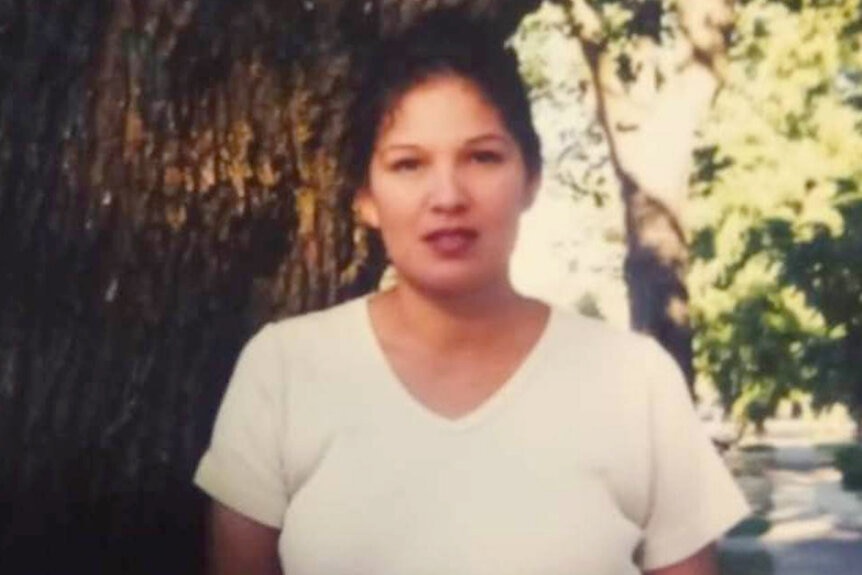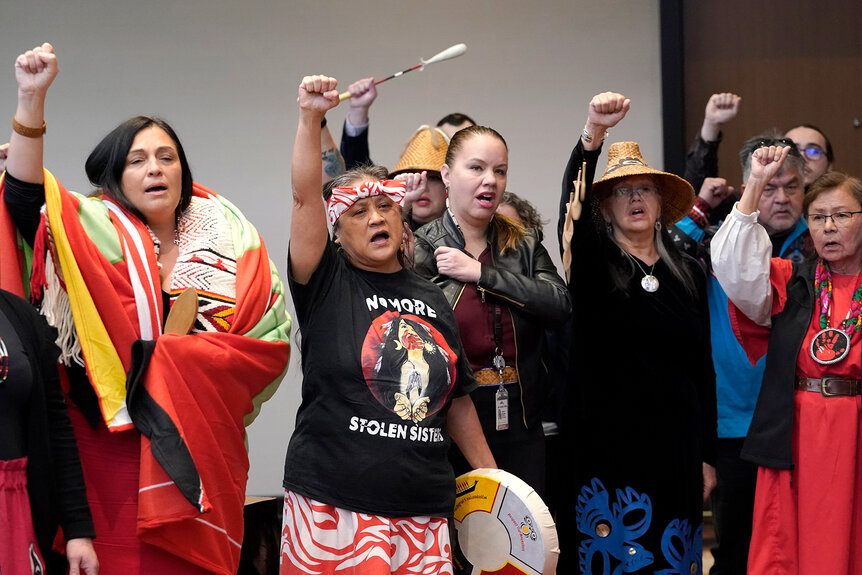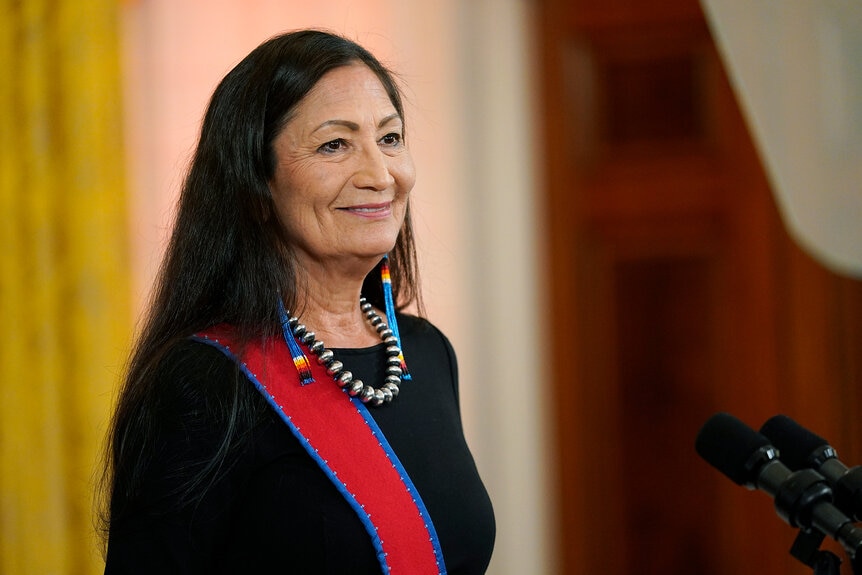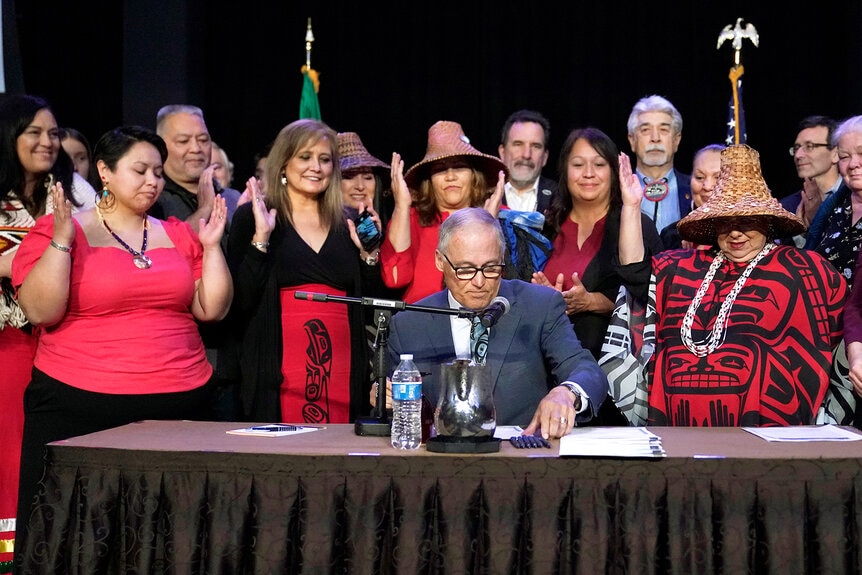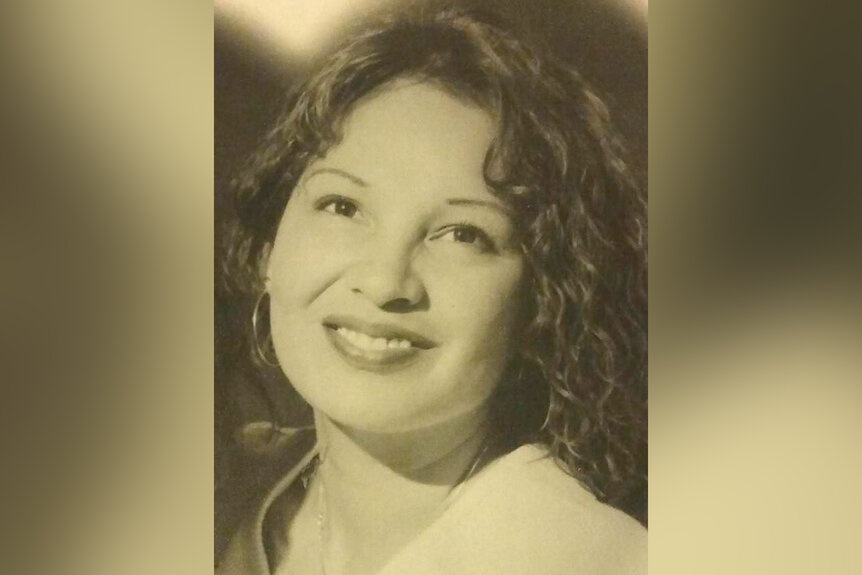Create a free profile to get unlimited access to exclusive videos, breaking news, sweepstakes, and more!
How One Indigenous Community Is Finding Healing After Loss
Mavis Kindness Nelson's body was found in a ravine on the University of Washington campus. As investigators scrambled to find her killer, state and federal officials were busy striving for change within the indigenous community.

Government agencies around the country continue to combat the disproportionate risk at which indigenous people go missing and become murdered.
In recent years, grassroots groups like the Missing and Murdered Indigenous Women and Girls (MMIWG) have highlighted the alarming statistics in which native females disappear or face homicidal violence.
In 2016, only 116 out of 5,712 reported cases were entered into the Department of Justice federal missing persons database, according to studies by the National Crime Information Center. Government agencies are still playing catch up to narrow in on actual numbers, which has proven difficult due to underreporting, lack of interagency databases and fewer resources within indigenous communities.
However, there has shown promise for real change in recent years.
Ernestine Morning Owl, a Yakama Nation elder whose sister was murdered earlier this year, recognizes the nationwide challenges faced by natives.
“There’s so many now, and it’s not just women anymore,” Morning Owl told Oxygen.com. “It’s children, it’s men, it’s elders.”
Morning Owl, of Oregon, was vacationing in Idaho with her daughter and grandchildren when she received a phone call from her nephew, Morning Owl explained. The man said authorities found his mother, Mavis Kindness “Boots” Nelson — Morning Owl’s younger sister — just days earlier and identified her remains.
However, the call came as a surprise for Morning Owl, who hadn’t even realized her sister was a missing person.
On June 20, the 56-year-old Seattle woman was found stabbed to death in the Kincaid Ravine on the University of Washington campus. At the time, Seattle police released little information about her death, even withholding her name, stating they’d located her body on a greenbelt near Ravenna Avenue NE and NE 45th Street.
According to the Seattle Times, Nelson was dismembered.
“It knocked me off my feet,” said Morning Owl. “I didn’t even know she was missing in the first place.”
Nelson’s murder would become one of many within the indigenous community in need of solving.
For relatives, Nelson’s then-unsolved murder didn’t make sense. She was a mother of three adult children — two sons and a daughter — who worked with the Compass Housing Alliance and Plymouth Housing to provide services for the unhoused population.
“She was a really kind person who would go out and help anyone,” Morning Owl told Oxygen.com. “She was fun-loving; she wasn’t a mean person. She was a nice person; very joyous to work with… she was a hard worker, all in all, a very helpful person because of the field that she worked in.”
The details surrounding Nelson’s disappearance were scarce. Police reports reviewed by Morning Owl show Nelson’s phone was last active on May 19 and that her daughter and coworkers reported her missing when she failed to show up to work.
“Being in the state of Washington, they didn’t have the equipment that would have furthered this faster and better,” said Morning Owl. “It’s a lot slower [in Washington].”
The investigation into Nelson’s death came at a pivotal time, as local, state and federal government agencies continued to address challenges faced by indigenous people.
In 2021, Attorney General Bob Ferguson announced the Washington State Missing & Murdered Indigenous Woman and People (MMIW/P) task force, consisting of 20-plus members, who were tasked with submitting two reports to the governor and legislature. Such members of the group include state representatives, lawyers and multiple tribal leaders.
The first of the two reports, published in August — two months after Nelson’s murder — stated that, according to the Washington State Patrol, there were 135 missing indigenous persons in the state, “and this number likely represents a significant undercount due to barriers to reporting and racial misclassification,” according to the report.
Indigenous people represent less than 2% of the state population (just under 149,000 in total). However, they account for nearly 5% of unsolved homicides in the state, according to the Attorney General’s report.
Citing multiple studies from 2018, the Attorney General’s office places homicide as one of the leading causes of death for indigenous people, with native women going missing at a rate four times greater than white females, and murder rates 10 times the national average.
“It’s getting worse out there,” Morning Owl commented.
But the report showed promise of real change for indigenous people, with the recent passage of a 2022 bill passing that will implement a state-wide Missing Indigenous Persons alert for when an indigenous person goes missing.
The task force also hopes to fund a Cold Case Investigation Unit within the Attorney General’s Office “with [a] dedication to understanding and addressing the disparity of violence against Indigenous people.”
The formation of the state’s MMIW/P and their continued progress comes at the heels of a movement at the federal level.
In April 2021 — a little more than a year before Nelson’s murder — Secretary Deb Haaland for the U.S. Department of the Interior announced the formation of the Missing & Murdered Unit (MMU) within the Bureau of Indian Affairs Office of Justice Services (BIA-OJS), providing interagency work and investigative resources to help solve cases of missing and murdered indigenous individuals.
“Violence against indigenous peoples is a crisis that has been underfunded for decades. Far too often, murders and missing persons cases in Indian country go unsolved and unaddressed, leaving families and communities devastated,” Haaland said in her announcement. “The new MMU will provide the resources and leadership to prioritize these cases and coordinate resources to hold people accountable, keep our communities safe, and provide closure for families.”
Since then, the MMU — headquartered in Albuquerque, New Mexico — has opened 17 offices across 12 states, the Department of Interior’s Press Secretary Tyler Cherry said in a statement to Oxygen.com.
“As of today, the MMU has investigated a total of 501 missing and murdered persons cases and has solved 68 missing persons cases and five murder cases,” said Cherry.
As federal agencies continue to combat the obstacles indigenous people face, Morning Owl told Oxygen.com of a more localized challenge she's had to face since her sister’s murder. Namely, the decision as to whether or not she should give Nelson a proper burial in accordance with Yakama Nation customs or let detectives keep the body to further their murder investigation.
Ultimately, Morning Owl wanted to find her sister’s killer.
“I’m not trying to change anybody’s culture. But our culture believes the same thing, that we bury our dead right away, as soon as possible,” said Morning Owl. “But under the circumstances, to get the killer off the street, I just told [authorities] to keep her body for as long as they can. So that way, it wouldn’t happen to anyone else… so we can get that person off the street. That's what I truly believe now.”
During their months-long investigation, detectives found that on May 19, Nelson took a Lyft to her Seattle apartment shortly after 10 p.m., the Seattle Times reported. According to Morning Owl, her sister was on her way home from a friend’s Auburn residence and called a man named Charles Becker.
Morning Owl was unfamiliar with Becker, assuming he was a “mutual friend” or a “party friend,” whom Nelson allegedly called on the way home. She noted Nelson was in a relationship with another man, who is not Becker, but whose name Oxygen.com declined to publish due to the ongoing investigation.
“It sounds like they met at her place,” Morning Owl told Oxygen.com. “After her place, they went to [Becker’s] place, and that’s the last time her phone was in progress.”
The decision to permit authorities to hold Nelson’s body proved essential, and on Oct. 4, Seattle Police announced that DNA found on a pair of medical gloves left with Nelson’s body linked 32-year-old Charles Becker to the crime scene.
Charging documents obtained by the Seattle Times state Becker — who lived in a dorm at the University District — admitted to drinking beer with Nelson on the night she disappeared.
Authorities believe Becker — and possibly another person — inflicted multiple sharp-force wounds causing Nelson’s death, and then stored her in his closet for an “extended amount of time,” according to NBC Seattle affiliate KING-TV. Becker reportedly stated Nelson “mysteriously died” before he stored her body.
Blood and other evidence found at Becker’s residence also led to his arrest, according to the Seattle Times.
“I just feel like Charles Becker stole from a lot of people,” Morning Owl told Oxygen.com. “That [Nelson] could have helped others in the future, that’s just how she was. She lived up to her last name, Kindness.” (Nelson was the victim’s name from a previous marriage).
Becker was previously convicted in 2016 of second-degree manslaughter for the death of his 4-month-old son, whom prosecutors say lived in a filthy and hazardous environment before asphyxiating on a plastic bag, according to Moscow-Pullman Daily News.
Court records show he only served just over two years behind bars, according to the Seattle Times.
Morning Owl said it’s important in cases of homicide to let detectives investigate because it can “save the next person.”
“It could be a relative, your brother or sister or anyone, a friend,” Morning Owl continued, adding it was necessary “to get the word out there.
“Justice for everyone,” she said. “It could be justice for that person laying there or while under investigation. Because their body does speak."
For now, Morning Owl says she is thankful that she could finally see her sister have a proper burial.
“I finally got to lay her to rest in September, and they found her in June,” Morning Owl told Oxygen.com. “I was willing to wait, and I’m glad I waited because they caught the guy.”
Mavis Kindness Nelson was buried at Black Wolf Cemetery near her mother, who served as a judge and as vice chairwoman for the Yakama Nation General Council.
Becker has pleaded not guilty to charges of first-degree murder and sexually violating human remains and is currently housed at the King County Jail on $5 million bail.
He is due in court on Dec. 8, according to KING-TV.
Government officials and lawmakers around the country are hard at work to fight injustices faced by indigenous peoples. Recently, the BIA-OJS created a website showcasing missing and murdered cases to assist families and law enforcement agencies in giving closure to families. It also acts as a tool for agencies to cross reference crimes that occur in Indian Country.
The MMU has also extended its collaborative relationships with long-standing agencies, including the National Center for Missing & Exploited Children, the FBI’s Forensic Laboratory, and more.
There are currently more than 40 active missing persons cases in Yakama Nation alone, ABC Kennewick, Washington affiliate KVEW reports.
According to the National Congress of American Indians, 574 federally-recognized Indian nations exist in the United States.
To learn more, visit the MMU’s website today.
